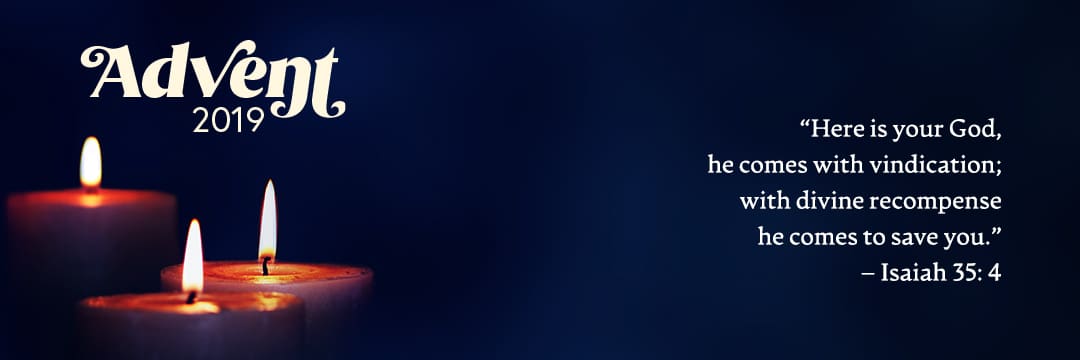Each week of this year’s Advent season, we will be sharing a reflection from one of our dedicated staff members. We hope that their words inspire a deeper sense of hope and wonder as we prepare for the coming of Christ.
God Comes to Save Us
In the first reading on Sunday we heard this passage from Isaiah 35:
“Here is your God, he comes with vindication; with divine recompense he comes to save you.”
– Isaiah 35:4
“He [God] comes to save you.” God…comes to save…me. Jesus died on the Cross in order to accomplish that very thing…for all of us. But, He didn’t just die on the Cross for us, He did, and still does, so much more for us since His death on the Cross. And during this time of Advent, it is a good thing to reflect on all that Christ has done for us.
I imagine you are familiar with the story of the Good Samaritan. There was a man, who we assume is a Jew, traveling from Jerusalem to Jericho, who was robbed and beaten and left for dead. A priest and then a Levite pass by him but render no aid. Then a Samaritan – and the Samaritans were the bitter enemies of the Jews – helps the man by treating his wounds and then putting him on his donkey and taking him to an inn, where he leaves money for the innkeeper to care for the man until the Samaritan returns.
Not Just Physical Aid, But Spiritual As Well
The surface meaning of the parable, which is pretty obvious to anyone who reads it, is that any man who needs our help is our neighbor. It seems to be all about rendering physical aid. But what many people do not know, is that there is a deeper allegorical meaning to the parable. A meaning that was recognized by many of the Church Fathers, such as St. Jerome, St. Ambrose, St. Augustine, and others. A meaning that shows the parable is about rendering not just physical aid to our neighbor, but spiritual aid as well.
And that meaning is this: The man who was attacked, beaten, and stripped represents Adam and all of Adam’s posterity – all of us. Jerusalem, whose root word – “salem” or “shalom” – means “peace” in Hebrew – represents the original state of peace and innocence man was in at his creation, which the man leaves by going down to Jericho, which represents the state of sin. The robbers represent Satan, who strip Adam and his posterity of their innocence and peace and leaves them – leaves us – with a wounded nature. The priest and the Levite represent the Old Law, which does not save us, while the Good Samaritan represents Jesus Christ, Who does save us. The donkey, or the beast as some translations say, represents Christ’s human nature. The inn represents the Church, and the innkeeper represents Peter and his successors.
He Made Man's Wounds His Own
So the deeper meaning of the Good Samaritan is that God, knowing fallen man – wounded man – needs His help, shows mercy on man by coming down to earth – by assuming man’s nature – to heal man’s wounds, by making man’s wounds His own. Jesus carries all of mankind on the back of His human nature, so to speak. He brings us to the Church, where we find aid and comfort and are able to heal our wounds by His grace, and where the innkeeper – St. Peter and all the popes and the bishops and priests with them – continues to care for wounded man until Jesus’ return.
When we recognize that the Good Samaritan is not just some imaginary heroic figure from a parable, but that it is Christ Himself, then it helps us to better understand, to get a broader picture, of what all Jesus has not just already done for us, but what He continues to do for us each and every day. Yes, He died for us on the Cross, but He also established His Church where we can go to have our spiritual wounds healed and to be loved and cared for by Christ – through Peter and the bishops in union with him – until He returns in glory.
Jesus saved us by His death on the Cross. Jesus continues to save us by giving us healing and grace and forgiveness through the Church. And Jesus will save us if…if…we remain faithful and run the race to the end.
“Here is your God, he comes with vindication; with divine recompense he comes to save you.”
– Isaiah 35:4
God bless!
– John Martignoni, Program Manager

